5 Ways to Build Rapport and Connect with Work Colleagues

Building rapport with colleagues, managers and customers is a critical stage of creating trust and building relationships. Without trust you limit what you can achieve at work, whatever your position. Everything becomes a lot harder and takes a lot longer.
Instinctively we all know this. We know how important building rapport is.
So I am covering what is rapport and then 5 ways to build rapport and connect with work colleagues which anyone can put into practice. Each of these 5 approaches really does help build rapport and helps you be more relaxed and confident when meeting new people.
5 ways of building rapport and connecting with work colleagues
- Be the Real You
- Turn Up Prepared
- Practice Positive Body Language
- Make the Conversation About Them
- The Power of Notes
Watch on YouTube
Listen on Podcast
What is rapport and how does rapport benefit you
Definitions of rapport talk about relationships and understanding each other well. Rapport comes from the French verb rapporter which means literally to carry something back. Having rapport means giving and receiving, of having two-way harmonious, aligned communications.
When I have rapport with someone I feel safe, relaxed, enjoyment, trusting, connected … I feel an understanding and ease of communication. Both parties create a virtuous communication circle.
When I don’t have rapport with someone, I find communicating a struggle, I am much more wary and extend less or no trust. It can be hard to break out of this circle of poor communication and trust.
With certain people you get instant rapport. With others rapport remains elusive. Use the rapport building advice we discuss today to build rapport with a wider range of people and build rapport quicker.
The benefits of building rapport in the workplace include:
- Trust is built a lot quicker
- Easier smoother communications with a less miss-understandings
- Stronger teamworking
- Team members are more engaged and excited about working together
- Individuals are more receptive to feedback
- Team members are more loyal to each other
It does not take much to see how these benefits make a big difference to team culture and performance. It certainly pays to make the effort to learn how to build rapport at work effectively.
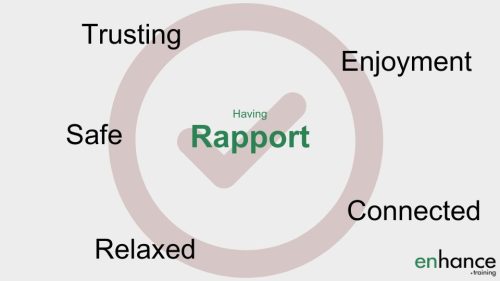
The first way to build rapport is Be The Real You
When building rapport, I think it is very important to be yourself, to be genuine and to be honest. Humans are very good at picking up on acts. Don’t be someone you are not.
That said, we all have many facets and different aspects to ourselves. We have our work lives, our home lives, our interests, our hobbies, sports etc. On top of that we have a ton of things we are interested in and learning about. You don’t need to be an expert in something to create connection through that interest.
The wider the range of interests you have, the wider range of people you will be able to find genuine areas of common interest.
Another way to get better at building rapport is to widen your range of interests or what you are interested in. Again, you can know little about something, be interested in learning more and use this desire to learn to create rapport. Show your interest and passion for learning more – rather than trying to be an expert or a similar level to the person you are talking to.
Common and shared interest and curiosity are key to being able to use many of the techniques to develop rapport more quickly and be able to do so honestly.
Simply put “People like people who are like themselves or who are like how they would like to be”.

Turn Up Prepared – The second way to build rapport
A little bit of preparation goes a long way in building rapport. Working out one or two common topics of conversation before meeting a particular person will make you more relaxed, more confident and allow you start a conversation about something you know they are interested in. This gives you a great head start in building rapport.
It is so much easier and quicker to do research in today world than years ago. A quick look on a LinkedIn profile or a quick google search on a person will probably give you a few clues to hobbies and interest – personal and professional. On linked in, you can look at what jobs they have done in which companies. That gives you opportunities to create interesting and relevant questions on both. On LinkedIn you might also find out some of their hobbies. You can see what groups they have joined and therefore guess at some of their interests. You can see which people are common connections for you both.
In addition you can speak to their colleagues and mutual connections and find out what they are interested in.
Their interests and hobbies might also give you are good insight into their values and what they care about. Show similar values to the person in question and your build stronger rapport.
Spend a few minutes putting together a few questions to ask to get them talking about areas they are interested in AND think about what stories you can share that demonstrate your interest in that area.
When you want to build rapport and connect with work colleagues turn up prepared!
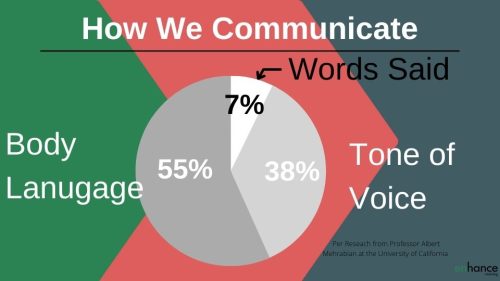
The third way to build rapport is practice Positive body language
The words you say only counts for around 7% of communication. How you use your voice and your body language account for 90%+. You must pay attention to your own body language and theirs.
Try building rapport with crossed arms and a frown while using a bored tone of voice. You will fail to build rapport spectacularly.
To build rapport, demonstrating you are interested in the other person and what they are saying is a must.
Project interested body language – good eye contact, interested facial expressions, attentive posture, encouraging nods etc. Use interested tones and pace of voice showing your energy and excitement toward the other person and the topic of conversation.
To improve building rapport quickly, consciously use mirroring and matching skills. Match your pace and tone of voice to theirs. Mirror aspects of their posture. For example if they lean forward you might do the same. If they tap their foot, match their tempo.
We all use mirroring and matching skills already – it is part of the social skills we develop. Being conscious of our bodies and how we use them, helps us more quickly mirror and match other people, particularly if they do things that we don’t tend to use very often.
Add verbal confirmation that you are interested and being attentive by paraphrasing – i.e. giving quick summaries of what the other person has said. Ask questions that encourage the other person to expand on points or clarify points they have made. Repeat back to the other person parts of their sentence and the words they have used.
Use verbal and body language communication to demonstrate your interest in them and your likeness with them. Demonstrating shared behaviours and values is very powerful.
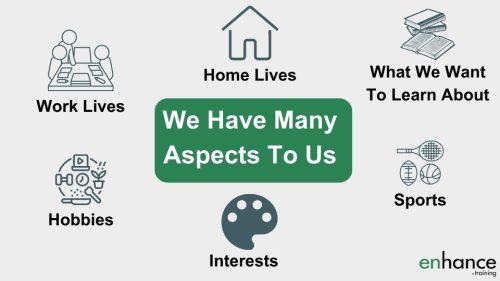
Make the conversation about them – the forth way to connect with work colleagues
Everyone loves talking about themselves and what they are interested in. Use this when building rapport and connecting with work colleagues, clients and anyone else you need to build relationships with.
When you have done a little research, you should have a few topics on which you can focus your questions. After giving them a warm greeting you can start asking your questions and listening.
When this approach doesn’t work then share a relevant story with them. By sharing first, you are extending trust to them. Once you have finished your relevant story about an area they are interested in, you can ask your questions and listen. Using a combination of these approaches, while using positive body language and voice tone, nearly always starts the conversation and rapport building.
Your aim is to spend more time listening than talking. Make them feel valued by keeping your attention laser focused on them. Don’t let your mind wander or your body language become less attentive.
The conversation should flow back and forth. You will be sharing your stories and views, and then asking questions to give the other person their chance to share and speak.
Next, mentally find what you admire about them. Everyone has something when you look hard enough. Keep that in mind and show your appreciation of them and what they are saying. Genuinely compliment and praise what you admire. This is another way to build rapport.
Your aim is get them talking and sharing. Spend more of your time listening than talking. Remember, the more they feel valued and admired by you, the more they will reciprocate and the quicker you will build rapport between you.
Make the conversation more about them than you!
The fifth way to build rapport is to use the The Power of Notes
When you meet the person for the second time and onwards, by remembering what you talked about and demonstrating this, you can really build on the rapport you created in the previous conversations.
By demonstrating you remember, you show how important the person and the conversation was to you. You demonstrate you care and you value them. This is incredibly powerful and gives you step changes in rapport building.
I feel great when people remember the detail of previous conversations and I see the effect on others when I do similarly.
The power of keeping notes – of a few key details of the conversations you have had – is big.
Whether you use mental notes to yourself or you actually write notes on paper or in a CRM system is up to you in terms of what best suits you and your situation.
The more people you build rapport with, the more conversations you have, the more points you have to remember and get right. When it gets beyond 10 people or so, I definitely start writing down notes. Doing this takes a few minutes after each meeting. Capture 2-5 points. Look at your notes prior to your next meeting with the person. Create this habit and you will make a big impact on your rapport building.
Enjoy building more rapport with a wider range of people in the workplace and outside.
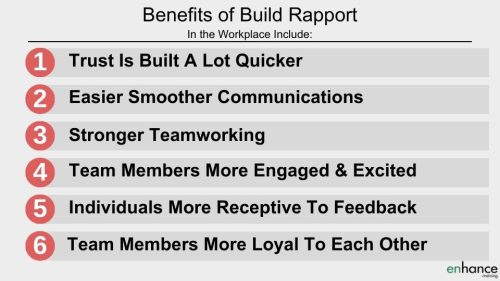
in summary
Building rapport and connecting with work colleagues is such an important part of building trust and positive relationships. Those that are good at networking – for instance – work hard at how they build rapport with others and how they maintain knowledge of the conversations they’ve had.
Use these 5 ways to build rapport and connect with work colleagues so you have a more productive and enjoyable work life.
To recap we have covered:
- Be the Real You
- Turn Up Prepared
- Practice Positive Body Language
- Make the Conversation About Them
- The Power of Notes
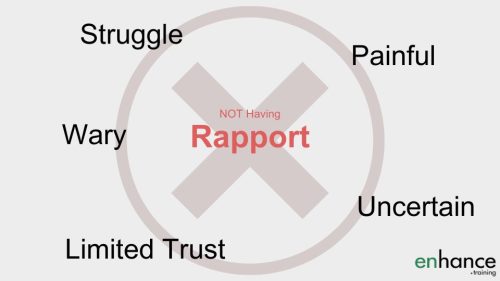
Being good at building rapport quickly is an amazing skill to have as a manager and leader. I personally as still working on improving how I build rapport despite decades of practice. I used to be very awkward when meeting new people and I was not very good at building rapport. I have improved hugely since those first days at EY. If an awkward shy boy can become reasonably good at building rapport, so can you.
Pay attention to your body language and tone of voice and theirs of course and make the conversation about them. You will be well on the way!
Enjoy meeting and build relationships with a lot more people.






